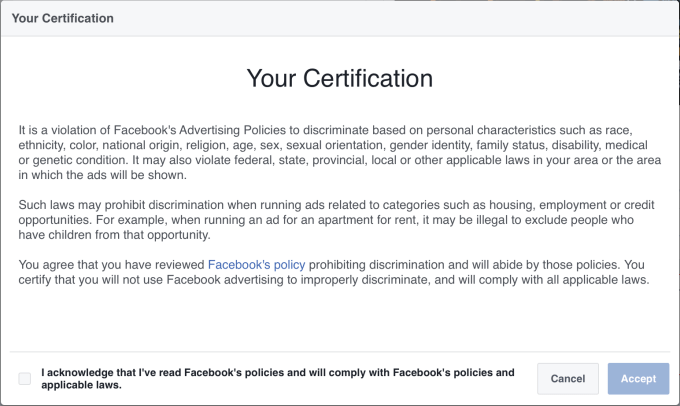Facebook announced in November that it would stop advertisers from targeting users by race for ads that focused on housing, employment, and credit opportunities, in response to a report that found that Facebook’s tools could be used to place discriminatory advertisements. Today, the social network provided a progress update on the matter, disclosing what actions it has taken since its announcement was first made, along with details of its new advertising policies and related tools.
Thanks to Facebook’s treasure trove of user data, advertisers on its site have been able to narrowly target users by a variety of factors, like age, location, gender, religion, and more. These microtargeting capabilities have been used for years in a number of ways, including, most recently in the U.S. presidential election to reach niche audiences with political ads customized to their own interests.
However, Facebook came under fire last fall because those same ad targeting capabilities were being used to include or exclude users from ad campaigns based on their “ethnic affinity,” –meaning race. Excluding certain races from housing and employment ads put the company in violation of anti-discrimination laws, including the Fair Housing Act of 1968 and The Civil Rights Act of 1964, Propublica’s report pointed out at the time.
The social network responded by saying it would disable ethnic affinity ad targeting for the ads that involved housing, employments or credit.
Facebook says it met with policymakers and civil rights leaders to gather feedback about what needed to be done, and has since made several changes.
The company’s new advertising policy now more clearly prohibits discrimination by spelling out that advertisers cannot discriminate against people based on “personal attributes such as race, ethnicity, color, national origin, religion, age, sex, sexual orientation, gender identity, family status, disability, medical or genetic condition,” the company explains today in a blog post about the new policies and features.
Additionally, Facebook is now linking to a new educational section from its Ad Policies page which offers more information along with other educational resources from places like government agencies and civil rights groups specializing in combating discrimination.
Beyond just spelling out what not to do, Facebook says it’s also beginning a test of new enforcement tools that will help it to identify ads that are in violation of its policies.
Specifically, these tools will identify housing, employment and credit opportunity ads and determine if they either include or exclude multicultural advertising segments – which are those consisting of people interested in seeing content related to the African-American, Asian American and U.S. Hispanic communities. If the ads are, in fact, including or excluding these segments, Facebook says it will disapprove the ad.

An informational message will alert the advertiser of the violation, so they can correct the problem if need be. In the case of a false positive, the advertiser can also click a button for a manual review.

Advertisers who are posting ads for housing, employment and credit, but are targeting other audience segments on Facebook, will be also be asked to click a button to certify that they understand the updated anti-discrimination policy.
Doing so pops up a window where the advertiser must read through the policy details, then agree that they will abide by its terms. They must check a box and then click “Accept” to continue.

The company says it worked with several groups during the creation of its new policies and tools, and gave thanks in its post to the following:
New York State Attorney General Eric T. Schneiderman; Members of the Congressional Black Caucus including Chairman Cedric Richmond, Rep. G.K. Butterfield, Rep. Yvette D. Clarke, Rep. Emanuel Cleaver, II, and Rep. Robin Kelly; the Congressional Hispanic Caucus and Chairwoman Michelle Lujan Grisham; Rep. David N. Cicilline, Co-Chair of the Congressional LGBT Equality Caucus; the American Civil Liberties Union; the Leadership Conference on Civil and Human Rights; the Center for Democracy & Technology; the NAACP Legal Defense Fund; the National Fair Housing Alliance; the Brookings Institution; and Upturn.
Additionally, many of the organizations pressed Facebook for the opportunity to work with the company further on ways that ad technology could be used instead to promote inclusion and opportunity for the underserved communities, in addition to protecting against discriminatory uses.
“We believe in the power of our advertising products to create opportunities for people from all backgrounds, so we are committed to working with these groups toward that goal,” Facebook said, referencing those requests. However, it didn’t provide any information on what steps it may be taking next on that front at this time.
